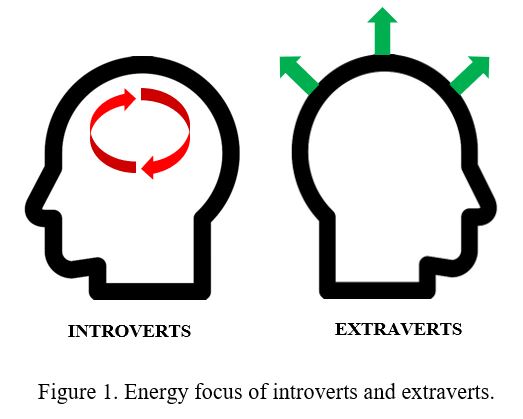The job interview is an opportunity to share your qualifications and enthusiasm for a position. How job candidates communicate, interact, and engage with interviewers, as well as answer questions, are often influenced by their personality type as theorized by Carl Jung, a Swiss psychologist and popularized by Katharine Briggs and Isabel Briggs Myers through the Myers-Briggs Type Indicator (MBTI). One part of the theory explores extroversion and introversion. Briggs Myers and Myers (1995) defined people with an introversion preference (hereafter referred to as introverts) as “the forethinkers” (p. 36) concerned with “the inner world of concepts and ideas” (p. 7) and people with an extroversion preference (hereafter referred to as extroverts) as “the afterthinkers” (p. 36) and “more involved with the outer world of people and things” (p. 7). Introverts focus their energy on what is inside themselves and extroverts focus their energy on what is outside of themselves (Jung, 1976) as illustrated in Figure 1. An introvert needs “a chance to write, reflect, and meditate” while an extrovert needs “a chance to express, the opportunity to talk and share” (Kroeger, Thuesen, & Rutledge, 2002, p. 253). Each person has both preferences with most having a tendency toward one (Briggs Myers & Myers, 1995; Jung, 1976) with library professionals preferring introversion by 60% (Schaubhut & Thompson, 2008). This article examines some of the strengths of each type and offers a few tips to minimize each type’s challenges.
Introverts have many strengths regarding job interviewing. They are generally prepared for interviews because they tend to internally process the information they will share before the interview. Since they think before they speak, their answers are usually well considered and concise. Introverts embrace pauses to allow time for both parties to reflect and often are in sync with interviewers since most library professionals are introverts. Because introverts have low-key demeanors, their nervousness does not show and put off the interviewer.
Introverts can overcome their interview challenges in a few ways. Since introverts are at risk of saying too little and selling themselves short, they need to work on fuller answers (Bayne, 2004) and share more than what they believe is a complete answer (Kroeger et al., 2002). Candidates are typically allowed about two minutes to answer a question, so take advantage of the full amount of time. Interviewers may perceive candidates as unprepared if their pauses are too long, so introverts can practice answers more thoroughly to reduce the length and number of pauses. Practicing answers out loud using a mirror or a trusted friend or relative can foster more confidence in answering questions. Because they focus inside their heads, they may seem aloof and not exhibit the expected enthusiasm for the job and organization (Kroeger et al., 2002). Be sure to smile, be present, and incorporate inflection in your voice throughout the interview.
In a job interview, extroverts have their own unique strengths. Since they are “natural-born talkers” (Kroeger et al., 2002, p. 257) as well as sociable and accessible (Briggs Myers & Myers, 1995), they have little difficulty expressing enthusiasm and interest in an interview (Bayne, 2004). They enjoy meeting and engaging with new people, so they build connections quickly with interviewers. They easily discuss their skills and experience by thinking on their feet (Bayne, 2004) and rarely run out of words when answering questions. With their easy and comfortable style, it is easy to enjoy their presence.
There are some challenges that extroverts should consider in their interview process. Some extroverts may ramble as they share new thoughts that pop into their heads. It is important to stick to the two-minute time limit with more concise answers and not veer off track. Kroeger, Thuesen, and Rutledge (2002) suggest extroverts take some “concentrated reflection time” (p. 253) and practice some answers to typical questions before an interview to focus their responses. In addition, some with a strong preference for extraversion may talk over the interviewer in their enthusiasm (Kroeger et al., 2002), so they must give interviewers time to complete their questions and reflect on the answers. Too much enthusiasm may work against candidates, so they need to find a happy medium to be successful.
Knowing these personality preferences allows candidates to tap into their interview strengths and work on their challenges. The selected tips give candidates the opportunity to present themselves more professionally and increase their chances of securing positions.
by Francis A. Alix, M.Ed., CCC, BCC, BCCC
Career Counselor/Coach
MLIS Special Student
References
Bayne, R. (2004). Psychological types at work: An MBTI perspective. London: Thomson Learning.
Briggs Myers, I. & Myers, P. B. (1995). Gifts differing: Understanding personality type. Mountain View, CA: Consulting Psychologists Press.
Kroeger, O., Thuesen, J. M., & Rutledge, H. (2002). Type talk at work: How the 16 personality types determine your success on the job. New York: Dell.
Jung, C. G. (1976). Psychological types (Bollingen Series XX). Princeton, NJ: Princeton University Press.
Schaubhut, N.A. & Thompson, R.C. (2008). MBTI type tables for occupations. Mountain View, CA: Consulting Psychologists Press.
Want more tips for the job hunt? Join ALASC as we host Jill Klees, iSchool Career Center Liaison, to learn about how to write the perfect resume and receive interviewing tips.
Date: April 8
Time: 6:30pm PT
Register here:
https://sjsu.zoom.us/meeting/register/c82acc62dfdda5f434538d7d4481ef37

